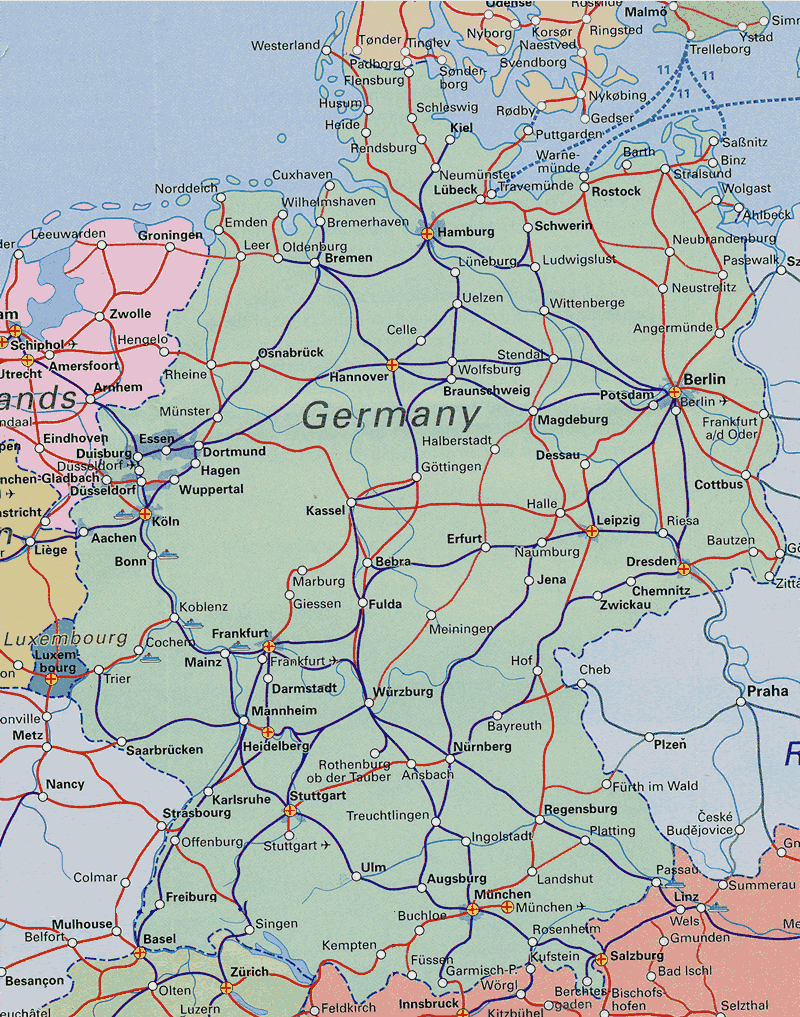 |
| Current map of railways in Germany which all started with the one from 1835. |
A major problem faced by the area
that was to become Germany was its economic prowess. The small principalities
of the area were concerned with losing their power which “did not permit the
growth of economic markets” (Hagen 70). I think that the key to every strong
nation is a powerful market. The area that would become Germany could not
produce goods and move those goods around the way other economies could, such
as France or Great Britain. A major advancement for the German economy came in
1835 when the “first German railway line…[opened]” (Hagen 130). This railway
was a way to unify the area and transport goods with greater efficiency. This
economic advancement led to jobs and innovations to help ultimately unite the
German nation. Later on this railway system would prove to be instrumental in
the movement of troops to defeat France in the Franco-German war.
There was still a lack of a
“German” identity until there became a common enemy and something to fight for.
This came about first in 1813 and again in 1859 and both times this was all
because of France. Yes there were other moments of nationalist surge but I
found these two specific ones to be especially interesting. Napoleon was waging
war on Prussia and this was being fought on their grounds. Due to the “shock of
defeat; a sense of humiliation; the financial burdens…” (Hagen 102) an
administrative reform of German states was created and overall German
nationalism blossomed. This nationalism did die down but oddly enough it was
Napoleon’s descendant, Napoleon III, who reignited nationalist propaganda. The
people desired the “creation of a sovereign German nation state that would
possess military power and…foreign affair [powers]” (Hagen 136). If Germany was
a united state then they would be able to defend themselves from France,
instead of using smaller, less organized military and have no say in foreign
issues that may involve the German area. I think it is funny that a vast
majority of German nationalism is all due to Napoleon in one shape or another,
either through his own actions or his descendant’s.
 |
| Napoleon Bonaparte: Leader of France |
| The current German flag originated from German activism. |
There was a surge in education
throughout the land that would become Germany. These young and enthusiastic
university students really served as major activists. These students even
adopted the colors of red, black and gold for their clothes during protests,
which obviously become the colors for the German flag. Demand for a unified
Germany was of the utmost importance. This revolutionary feeling actually led
to a very suppressive constitution, but also a large time for peace in Europe.
During the time of peace an actual German culture was able to begin with
artwork, music, and architecture.
One of the most interesting things
I got from the reading was that France played such a weird role in the creation
of the German state. As I said earlier most of Germany despised the French and
that created a heated nationalistic feeling, but “sixteen states in south and
southwest Germany signed an act that abolished their connection with the empire
and established a protectorate under Napoleon…” (Hagen 99). Clearly France was
a huge power that Germans feared, so why not get their help? I also found it
funny that Prussia and Austria both modeled some of their policies after the
French. So while France was only using Prussia as a buffer from Russia, they
helped to really create a unified German state in multiple ways.
 |
| Otto Von Bismark: The leader of the Prussian/German military in the Franco-German war. |
Bismarck was the man that
ultimately created the unified German state even though that was not his goal
when he was appointed to be the head of the government. This was a very
unpopular move among liberals. His ultimate goal was to expand Prussian
territory in Europe. Bismarck managed to kick Austria out of German territory
with a Prussian victory. After this the French declared war, which was
ultimately won by Bismarck because of the ability to mobilize and move troops.
The resulting treaty won back Alsace and Lorraine and really drove home the
German state. After this southern Germany saw it to be in its best interest to
join the North German Confederation and that created the German state.